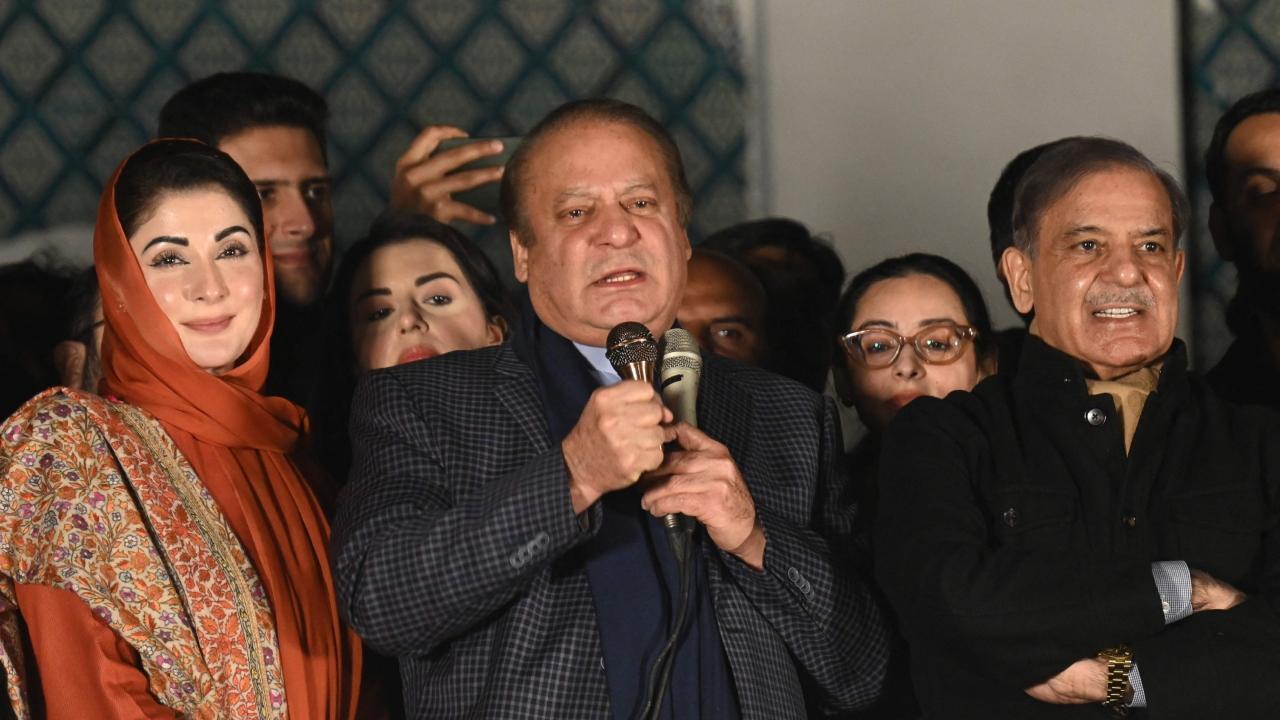The Pakistan Muslim League-Nawaz and the Pakistan Peoples Party are moving ahead with plans to form a coalition government by March 2, reports suggest

Nawaz Sharif. File Pic/AFP
With a power-sharing deal already inked, the Pakistan Muslim League-Nawaz and the Pakistan Peoples Party are moving ahead with plans to form a coalition government by March 2 and hold the presidential election before March 9, according to a media report on Friday.
ADVERTISEMENT
The Pakistan Muslim League-Nawaz (PML-N) led by three-time prime minister Nawaz Sharif will be backed by the Pakistan Peoples Party (PPP) of former foreign minister Bilawal Bhutto-Zardari has agreed to form a new government after the February 8 elections resulted in a hung Parliament.
Former prime minister Shehbaz Sharif, 72, is set to return to the top post after his elder brother Nawaz, decided to nominate the PML-N president for premiership.
The party has clarified that the three-time former prime minister did not want to lead a government in which the PMN-L does not have a majority in Parliament.
Both parties won fewer seats than candidates backed by jailed former Prime Minister Imran Khan.
Quoting sources, The News International reported that serious consideration is being given to the proposal to hold the presidential election before March 9 as the newly elected assemblies across the country will take oath by February 29 and a new government be in place by March 2.
Incumbent President Dr Arif Alvi's five-year tenure officially ended in September of last year. However, the dentist-turned-politician, who was a senior member of Khan's PTI before being appointed to the post in 2018, continued to stay in the office even after the expiration of his stipulated constitutional term.
The PML-N, PPP, and their allied parties want the presidential election to be held by March 8 before the completion of the current tenure of the Senate and for the Senate elections to be held after the president is elected.
When contacted, PPP senior leader Senator Farooq H Naek said that according to Article 41, read with the second schedule of the Constitution, the presidential election has to be held within 30 days of the general elections.
This means that the presidential election is to be held before March 9, he was quoted as saying by the report.
President Alvi, 74, had agreed to perform his duties until the appointment of his successor as the assemblies were dissolved in August and the elections were not held as per the constitutional time limit.
PPP Co-Chairperson Asif Ali Zardari, 68, will likely return to the presidency as earlier this week the Bilawal-led party and PML-N agreed to nominate him for the constitutional office as a joint candidate in return for helping Shehbaz Sharif form the government at the Centre under a power-sharing agreement.
To form a government, a party must win 133 out of 265 contested seats in the 266-member National Assembly.
The power-sharing deal was finalised after no political party secured a simple majority in the February 8 elections, forcing parties to join hands in their bid to form a government and deny a chance to Imran Khan's PTI to return to power.
Shehbaz Sharif and Bilawal have said that they have the required support to form a coalition government.
In the polls, Khan's PTI-backed independent candidates secured victory on the most National Assembly seats (92) followed by the PML-N (79) and the PPP (54).
Meanwhile, Pakistan Muslim League (N) president and prime minister-designate Shehbaz Sharif on Friday met delegations from MQM, the Muslim League (Q) and the Balochistan Awami Party and discussed issues related to the country's situation and political cooperation.
"It is everyone's responsibility to save the country from economic threats," Shahbaz Sharif said and vowed to move forward unitedly to serve the people.
This story has been sourced from a third party syndicated feed, agencies. Mid-day accepts no responsibility or liability for its dependability, trustworthiness, reliability and data of the text. Mid-day management/mid-day.com reserves the sole right to alter, delete or remove (without notice) the content in its absolute discretion for any reason whatsoever
 Subscribe today by clicking the link and stay updated with the latest news!" Click here!
Subscribe today by clicking the link and stay updated with the latest news!" Click here!







